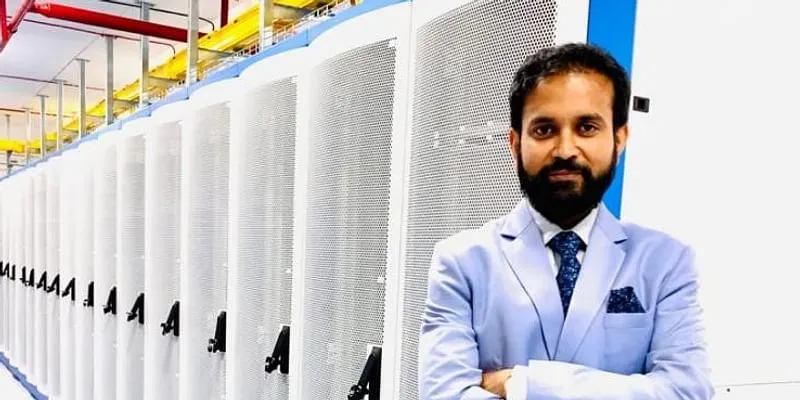At 23, he started his business in a kindergarten centre. Now he runs a Rs 160 Cr turnover company
With no revenue to rent an office, Piyush Somani started a small web hosting support business in a kindergarten centre in Nashik, where his team worked after the kids had left.
Born into a middle-class family in Maharashtra, Piyush Somani was an average student in academics. Due to his father’s profession as a bank official, Piyush’s family was usually on the move. In 1989, the family settled in Nashik. In 1999, Piyush left for Pune to pursue engineering.
“Most of my family members worked in one bank or another. After I completed my engineering, at 22, my father and uncle advised me not to get into banking like them. They told me if I became a banker, I would work for 30 years for an organisation that didn’t respect me,” he shares.
His family urged him to start a business, but he did not trust their judgement right away. He took up a job at a manufacturing company in Mumbai but later moved back to Nashik to work for an IT company as his income did not suffice his stay in Mumbai.
“Changing two jobs in one year, I realised my father and uncle were right. The culture in most Indian companies back then was bad, and my friends working in IT/ITES companies gave me the same feedback. So, I decided to start my own business where I would be respected, and all the people working with me would get equal respect as well,” he says.
A small yet promising start
In November 2003, 23-year-old Piyush and seven friends decided to start a small web hosting support business. But with no revenues yet, they couldn’t afford to rent an office space.
A partner’s mother happened to run a kindergarten centre in the city, who offered the space to Piyush and his team to run the business after the kids had left. Piyush, armed with a single computer of his own, agreed.
His friends, too, brought a few computers from home and installed them in the kindergarten room. Piyush’s father gave them Rs 25,000 to purchase an Internet connection.
During the day, the kids occupied the kindergarten centre, and after they left, Piyush and his partners would use the shared space.
Thus began Piyush’s web hosting support business. Today, it is known as ESDS Software Solution — a name Piyush registered in 2005.

Piyush Somani
A booming business with top clients
ESDS is no more a small group of web support workers sitting in a kindergarten centre. The company claims that today, it is a Rs 160 crore revenue managed data centre and cloud hosting services provider with over 850 employees.
Forty-one-year-old Piyush, the Founder, CMD, and CEO at ESDS, says, “As a first-generation entrepreneur, I have taken multiple roles in ESDS. I was able to build a good reputation for the company and grow business via nurturing long-term relationships.
“Over the last 15 years, we have built our capabilities in providing cloud hosting platforms, data centre management systems, digital banking solutions, and various cloud-based SaaS offerings,” he adds.
ESDS’ cloud offerings and software products enable the digital transformation of its customers that comprise enterprises across sectors, banks, and government organisations.
The company lists Infosys, The Muthoot Group, LTI (Larsen and Toubro Infotech), , MUDRA, Essar, , , and other government bodies among its clientele.
“Those who got on board with ESDS as cloud hosting customers now consume dozens of other services and offerings we provide. ESDS is no longer just an Indian cloud service provider. We are now considered a strong digital transformation company that is Made in India,” Piyush says with pride.
Coming back from the brink of bankruptcy
Piyush’s entrepreneurial journey would have gone a lot differently if ESDS had succumbed to its difficult start. Initially, the company provided technical support to web hosting companies from the US and UK, but the differences in time zones made things challenging for the small team.
“In those early days, we faced huge stress and constraints in managing a large number of international projects. In 2006, we had to drop a few that resulted in a big drop in revenue. Further, many customers built their own web hosting companies and stopped paying us for the support we provided,” he says.
ESDS was on the verge of bankruptcy and needed to do things differently. Despite losing all his savings in less than a year, Piyush trudged on.
As reality hit him hard, and he saw there wasn’t much scope left for outsourced technical support businesses like his, he decided ESDS would become a web hosting company itself.
“It was a highly emotional period as I was attached to my employees, but we had to scale down from 60 people to just 25 in eight months. In this process, we were able to take over some of the US and UK-based web hosting companies. We then poured our hearts and souls into building these companies into profit-making entities,” he adds.
Growth story and business model
Although it came at a high price — financially and emotionally — the pivot worked. ESDS started seeing steady revenue from the newly-acquired companies. These firms started becoming popular as ESDS provided them with technical support service.
“In 2010, we launched ESDS’ first data centre in India. We began focussing on banking and government customers through cloud and data centre services. By 2016, we had built one of the largest data centres in Mumbai. Today, there is no looking back because we are continuously growing and building the best data centres in the country.”
ESDS’ current business model can be broadly divided into two categories — cloud and data centre services and product R&D.
In the services category, it provides managed cloud hosting and data centre services through its products eNlight Cloud, eNlight 360°, eMagic, VTMScan, and more.
Citing an example, Piyush says, “VTMScan has been developed specifically to safeguard web assets. All websites of the State Bank of India are fully secured using VTMScan. In fact, other big banks, including UCO Bank, Union Bank, DENA Bank, Vijaya Bank, Andhra Bank, etc., also use this service.”
In its product R&D division, ESDS takes care of strategic product development. It has built portals such as MUDRA and Stand-Up India for the Prime Minister’s office. ESDS is also working on digital portals for IFCI and the Maharashtra state government.
“We are now touching the lives of 600 million Indians through over 200 government organisations hosting their data on our cloud, and more than 380 banks hosting their CBS solutions with us,” Piyush claims.
The road ahead for ESDS
Piyush admits that ESDS competes against some of the “world-class, international data centres and hosting companies.” However, he believes ESDS had a head start in India since it began operations “when no data centre or hosting provider was offering these kinds of services.”
“We gained experience and knowledge from our US and UK hosting businesses. We were able to build end-to-end digital solutions and innovative products, as well as continuously modernise our cloud infrastructure. Some of our products were game-changers in India as they made manual work automatic. These factors have helped us stay ahead of the competition,” he says.
Moving forward, ESDS plans to invest further in a global data centre market, where end-user spending is projected to reach $200 billion in 2021 — an increase of six percent from 2020 — according to the latest forecast from Gartner, Inc.
ESDS is investing in the infrastructure space in south India, especially in Chennai and Bengaluru. In fact, it intends to build data centres in Hyderabad, Kolkata, and other regions. From a global perspective, it is looking to set up data centres in the Middle East, North Africa, South Asia, and the US.
Edited by Suman Singh









